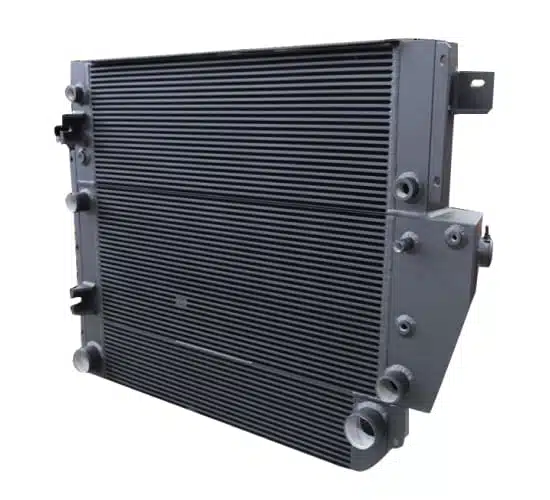Introduction
Heavy-duty oil cooler is a high-capacity heat exchanger designed to remove excessive heat from oil used in engines, transmissions, hydraulics, or compressors in demanding applications. In industrial or off-highway systems, oils tend to heat up rapidly due to continuous motion, high friction, and pressure. If this heat is not effectively dissipated, the oil can degrade, losing its lubricating and cooling properties, which leads to equipment failure, decreased efficiency, and increased wear and tear.
Unlike standard coolers, heavy-duty variants are engineered to operate under:
- Extreme temperatures
- Harsh environments
- Constant mechanical stress
- High oil flow and pressure rates
Key Features on Heavy-Duty Oil Cooler
High Thermal Efficiency
- Designed with enhanced surface area geometries such as fins, corrugated plates, or turbulators inside tubes or plates.
- Maximizes heat transfer coefficient by creating turbulent flow even at lower oil flow rates.
- Materials like aluminum offer high conductivity, while designs like bar-and-plate or brazed plate enable efficient heat dissipation with compact size.
- Often paired with dedicated fans or water systems to accelerate the cooling process.
Durable Construction
- Constructed using corrosion-resistant and high-strength metals like stainless steel, copper-brass, or even nickel-based alloys.
- Engineered to handle shock, vibrations, and thermal expansion during start-up and shutdown cycles.
- Frames and mounts are reinforced with anti-vibration pads, shock mounts, and protective coatings to resist outdoor elements like dust, moisture, and UV rays.
- Welds are often X-ray tested or pressure-tested to ensure long-term leak-proof performance.
Corrosion and Vibration Resistance
- Exposure to acidic or dirty oils, saline water, or chemical-laden environments can corrode metal surfaces — hence, many heavy-duty oil coolers are anodized, epoxy-coated, or rubber-lined.
- In mobile or marine applications, vibration from engines or rough terrain can lead to fatigue cracking — so oil coolers are mounted on flexible bases and tested for vibration cycles to prevent long-term damage.
- Specialized versions include marine-grade materials or multi-layer coatings to prevent rusting.
Customizable Configurations
- Oil coolers can be tailored to specific industry needs:
- Multi-pass vs single-pass flow paths
- Horizontal or vertical mounting options
- Fan-assisted or pump-assisted cooling
- Can be integrated with thermostatic valves, bypass circuits, or remote oil filters for complete oil temperature management.
- Pressure and temperature ratings can be selected to match the system’s specific requirements.
Common Applications
Heavy Equipment & Off-Road Machinery
- Excavators, bulldozers, and mining trucks operate in tough environments and use hydraulic systems extensively.
- Oil heats up fast and must be cooled to prevent fluid breakdown and loss of hydraulic response.
- Heavy-duty oil coolers help maintain equipment uptime during long working hours in mining, forestry, and construction.
Industrial Machinery
- Hydraulic presses, injection molding machines, and CNC machines often run 24/7.
- Oil temperature must remain within tight limits to maintain dimensional accuracy and prevent hydraulic failure.
- Coolers ensure stable system behavior and extend the life of hydraulic valves and seals.
Trucks and Commercial Vehicles
- Trucks carrying heavy loads over long distances generate heat in their transmission, differential, and engine.
- Oil coolers maintain engine efficiency, reduce stress on the gearbox, and help prevent thermal breakdown of transmission fluid.
- Particularly vital in mountainous or tropical regions with poor ventilation and high ambient temperatures.
Marine Engines
- Large boats and ships often operate in continuous-duty cycles, requiring cooling of engine and gear oils.
- Oil coolers in marine settings must resist saltwater corrosion and provide cooling despite limited airflow.
- Water-cooled shell and tube oil coolers are widely used in marine engines due to space constraints and high power density.
Power Generation
- In generators, turbines, or transformers, oil serves both as coolant and dielectric.
- Oil coolers remove heat generated during power transmission and mechanical operation, ensuring safe operation and preventing transformer oil degradation.
Types of Heavy-Duty Oil Cooler
Air-Cooled Oil Coolers
- Use ambient air as the cooling medium, often via axial or radial fans.
- Suitable for mobile equipment, agricultural machinery, and remote areas with no water supply.
- Less complex and easier to install but may be less efficient in hot climates or confined spaces.
Water-Cooled Oil Coolers
- Oil is cooled using water through shell and tube, brazed plate, or spiral heat exchangers.
- Ideal for stationary machinery, marine, or industrial power systems with access to cooling water.
- Can handle very high heat loads with more stable cooling performance.
Bar and Plate Oil Coolers
- Use layers of bars and plates brazed together to form internal flow passages.
- Extremely robust and compact; suitable for motorsport, defense vehicles, and high-performance applications.
- Withstand high-pressure pulsations, thermal shock, and vibrations.
Shell and Tube Oil Coolers
- Consist of a bundle of tubes inside a cylindrical shell.
- Oil flows through one side and water through the other, ensuring efficient counter-current heat exchange.
- Easy to dismantle for cleaning and inspection — ideal for process industries and marine setups.
Maintenance & Key Considerations – Detailed
- Regular inspection: Look for signs of fouling, pressure drops, or reduced performance.
- Flushing and cleaning: Periodically clean internal surfaces, especially in dusty or contaminated environments.
- Oil compatibility: Ensure materials are compatible with the type of oil (mineral, synthetic, biodegradable).
- Pressure and flow rate design: Oversizing or undersizing affects cooling performance and may cause pressure loss.
- Installation environment: Choose air-cooled for outdoor/mobile; water-cooled for indoor/heavy-duty systems.
Conclusion
In high-demand industrial and mobile applications, maintaining oil temperature is not just a performance requirement—it’s a critical safeguard against system failure. Heavy-duty oil coolers play a vital role in enhancing the efficiency, reliability, and longevity of machinery by effectively removing excess heat from lubricating and hydraulic oils. Whether it’s in construction equipment, marine engines, power plants, or high-speed trucks, these coolers are engineered to withstand extreme thermal loads, vibrations, corrosive environments, and intense operational cycles. Their versatility across air-cooled, water-cooled, and bar-and-plate designs makes them suitable for a wide spectrum of industries and conditions.

